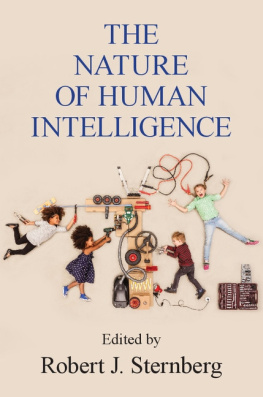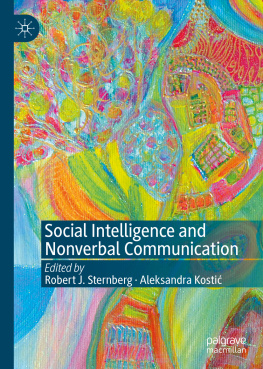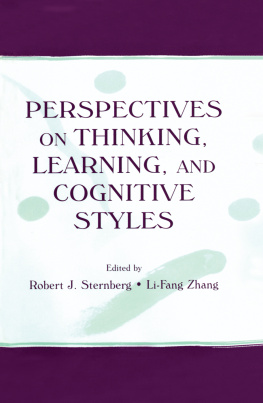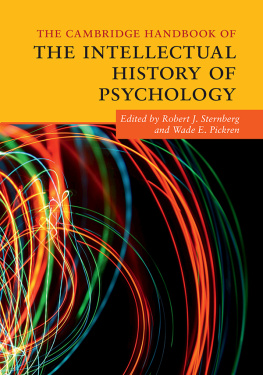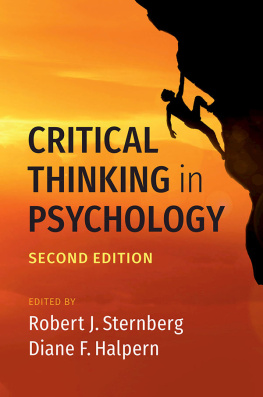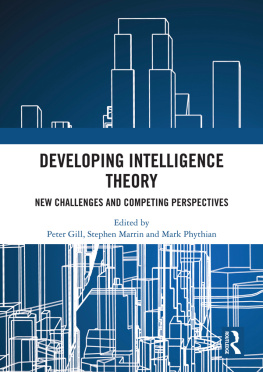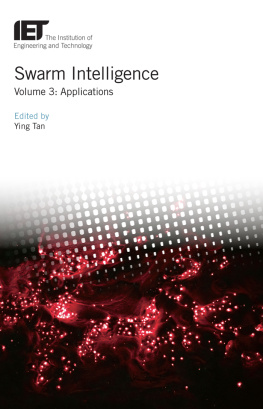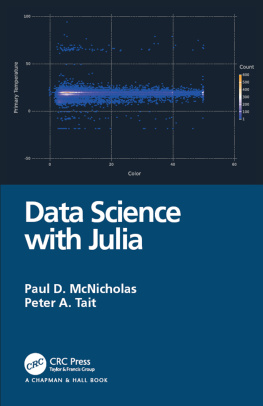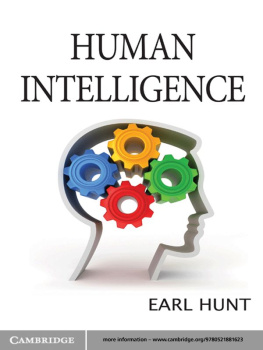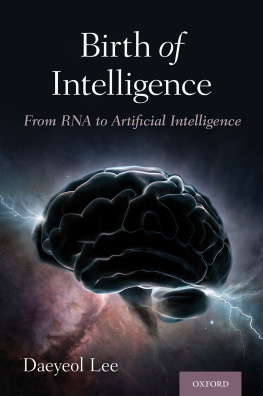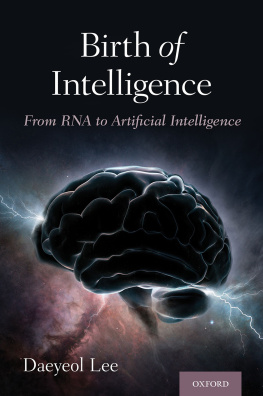The study of human intelligence features many points of consensus, but there are also many different perspectives. In this unique book Robert J. Sternberg invites the 19 most highly cited psychological scientists in the leading textbooks on human intelligence to share their research programs and findings. Each chapter answers a standardized set of questions on the measurement, investigation, and development of intelligence and the outcome represents a wide range of substantive and methodological emphases including psychometric, cognitive, expertise-based, developmental, neuropsychological, genetic, cultural, systems, and group-difference approaches. This is an exciting and valuable course book for upper-level students to learn from the originators of the key contemporary ideas in intelligence research about how they think about their work and about the field.
Robert J. Sternberg is Professor of Human Development at Cornell University and Honorary Professor of Psychology at the University of Heidelberg. Formerly he was IBM Professor of Psychology and Education at Yale University. He holds a PhD from Stanford University, along with 13 honorary doctorates. He has won both the James and Cattell Awards from the Association for Psychological Science and is a member of the National Academy of Education and the American Academy of Arts and Sciences. He is a former president of the American Psychological Association and the Federation of Associations in Behavioral and Brain Sciences. He is among the most cited psychologists in the world, with roughly 138,000 citations and an hcitation index of 182.
Robert J. Sternberg
One Liberty Plaza, 20th Floor, New York, NY 10006, USA
Cambridge University Press is part of the University of Cambridge.
It furthers the Universitys mission by disseminating knowledge in the pursuit of education, learning, and research at the highest international levels of excellence.
www.cambridge.org
Information on this title: www.cambridge.org/9781316629642
DOI: 10.1017/9781316817049
Cambridge University Press 2018
This publication is in copyright. Subject to statutory exception and to the provisions of relevant collective licensing agreements, no reproduction of any part may take place without the written permission of Cambridge University Press.
First published 2018
Printed in the United States of America by Sheridan Books, Inc.
A catalogue record for this publication is available from the British Library.
Library of Congress Cataloging-in-Publication Data
Names: Sternberg, Robert J., editor.
Title: The nature of human intelligence / edited by Robert J. Sternberg.
Description: New York: Cambridge University Press, 2018. |
Includes bibliographical references and index.
Identifiers: LCCN 2017044205| ISBN 9781107176577 (hardback) |
ISBN 9781316629642 (paperback)
Subjects: LCSH: Intellect.
Classification: LCC BF 431. N 384 2018 | DDC 153.9dc23
LC record available at https://lccn.loc.gov/2017044205
ISBN 978-1-107-17657-7 Hardback
ISBN 978-1-316-62964-2 Paperback
Cambridge University Press has no responsibility for the persistence or accuracy of URLs for external or third-party internet websites referred to in this publication and does not guarantee that any content on such websites is, or will remain, accurate or appropriate.
This book is dedicated to the memory of Earl Hunt, a pioneer in the field of intelligence and a scholar whose influence only will become stronger in the years to come .
Contributors
Ackerman, Phillip L. Georgia Institute of Technology
Bouchard, Thomas J., Jr. University of Minnesota
Butler, Heather A. California State University, Dominguez Hills
Ceci, Stephen J. Cornell University
Chen, Jie-Qi. Erikson Institute
Conway, Andrew R. A . Claremont Graduate University
Deary, Ian J. University of Edinburgh
Engle, Randall W. Georgia Institute of Technology
Ericsson, K. Anders. Florida State University
Flynn, James R. University of Otago
Gardner, Howard. Harvard University
Ginther, Donna K. University of Kansas
Gottfredson, Linda S. University of Delaware
Grigorenko, Elena L. Baylor College of Medicine, St. Petersburg University, Russia, University of Houston, Yale University
Haier, Richard J. University of California, Irvine
Halpern, Diane F. Claremont-McKenna College and Minerva Schools at KGI
Kahn, Shulamit Boston University
Kaufman, Alan S. Yale University
Kaufman, Scott Barry . University of Pennsylvania
Kornhaber, Mindy. Pennsylvania State University
Kovacs, Kristof . Eszterhazy Karoly University
Lubinski, David. Vanderbilt University
Lynn, Richard. University of Ulster
Mayer, John D. University of New Hampshire
Ritchie, Stuart J. University of Edinburgh
Shipstead, Zach. Alma College
Sternberg, Robert J. Cornell University
Williams, Wendy M. Cornell University
Preface
).
). The rest, as they say, is history. Today, the field of intelligence research is about as active as any field could be. Indeed, its form seems to change every few years, or, arguably, every few months!
), but these handbooks were intended to be comprehensive reviews rather than updates regarding current research on particular topics. Yet, the field continued to advance rapidly.
So I recently decided to edit a volume of updates on intelligence research. In the past, I had just chosen colleagues to write whose work I admired because of its impact on the field. But at the same time, I realized that my selections were always colored by my own biases about what kinds of research were worthwhile to the field. Those biases led to some kinds of work being included, but not others. This time I wanted to do things a bit differently.
When I started this volume, I recently had coedited a volume of essays by eminent to have made the highest-impact contributions to the study of intelligence.
had these scholars lived and been willing to contribute.
are many excellent scholars, especially ones early in their careers, who have not written for it. But this certainly will not be the last edited book of advances in the field of human intelligence, and later volumes (edited by others) doubtless will include approaches that may be underrepresented here.
Although intelligence always has been important to society, one might argue that, in some respects, was a good question to ask. I hope the essays in this book provide some enlightenment as to the answer!
References
Carroll , J. B. ( 1993 ). Human cognitive abilities: A survey of factor-analytic studies . New York : Cambridge University Press .
Detterman , D. K. (Ed.) ( 1985 ). Current topics in human intelligence (Vol. 1). Norwood, NJ : Ablex .
Flynn , J. R. ( 2009 ). What is intelligence? Beyond the Flynn effect . Cambridge : Cambridge University Press .
Goldstein , S. , Princiotta , D. , & Naglieri , J. (Eds.) ( 2015 ). Handbook of intelligence: Evolutionary theory, historical perspective, and current concepts . New York : Springer .
Horn , J. L. , Donaldson , G. , & Engstrom , R. ( 1981 ). Apprehension, memory, and fluid intelligence decline in adulthood . Research on Aging , (), .

